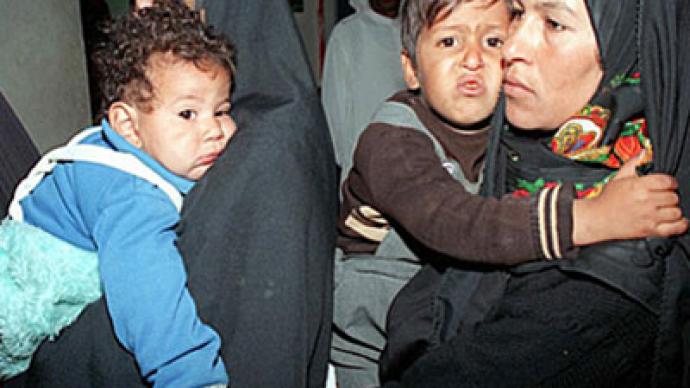Horrors of war: US, UK munitions ‘cause birth defects in Iraq’

US and UK weapons ammunition were linked to heart defects, brain dysfunctions and malformed limbs, according to a recent study. The report revealed a shocking rise in birth defects in Iraqi children conceived after the US invasion.
Titled ‘Metal Contamination and the Epidemic of Congenital Birth Defects in Iraqi Cities,’ the study was published by the Bulletin of Environmental Contamination and Toxicology. It revealed a connection between military activity in the country and increased numbers of birth defects and miscarriages.The report, which can be found here, also contains graphic images of Iraqi children born with birth defects. (The images were not published on RT due to their disturbing content.) It documents 56 families in Fallujah, which was invaded by US troops in 2004, and examines births in Basrah in southern Iraq, which was attacked by British forces in 2003. The study concluded that US and UK ammunition is responsible for high rates of miscarriages, toxic levels of lead and mercury contamination and spiraling numbers of birth defects, which ranged from congenital heart defects to brain dysfunctions and malformed limbs. Fallujah, around 40 miles west of Baghdad, was at the epicenter of these various health risks. The city was first invaded by US Marines in the spring of 2004, and then again 7 months later. Some of the heaviest artillery in the US arsenal was deployed during the attack, including phosphorus shells.
Shocking findings
Between 2007 and 2010 in Fallujah, more than half of all babies surveyed were born with birth defects. Before the war, this figure was around one in 10. Also, over 45 percent of all pregnancies surveyed ended in miscarriage in 2005 and 2006, compared to only 10 percent before the invasion. In Basrah’s Maternity Hospital, more than 20 babies out of 1,000 were born with defects in 2003, 17 times higher than the figure recorded in the previous decade.Overall, the study found that the number of babies in the region born with birth defects increased by more than 60 percent (37 out of every 1,000 are now born with defects) in the past seven years. This rise was linked to an increased exposure to metals released by the bombs and bullets used over the past decade.Hair samples of the population of Fallujah revealed levels of lead in children with birth defects five times higher than in other children, and mercury levels six times higher. Basrah children with birth defects had three times more lead in their teeth than children living in areas not struck by the artillery.
The study found a "footprint of metal in the population,” Mozhgan Savabieasfahani, one of the lead authors of the report said. Savabieasfahani is an environmental toxicologist at the University of Michigan's School of Public Health."In utero exposure to pollutants can drastically change the outcome of an otherwise normal pregnancy. The metal levels we see in the Fallujah children with birth defects clearly indicates that metals were involved in manifestation of birth defects in these children," she said. The study's preliminary findings, released in 2010, led to an in-depth inquiry on Fallujah by the World Health Organization (WHO), the results of which will be released next month. The inquiry is expected to show an increase in birth defects following the Iraq War.According to the WHO, a pregnant woman can be exposed to lead or mercury through the air, water and soil. The woman can then pass the exposure to her unborn child through her bones, and high levels of toxins can damage kidneys and brains, and cause blindness, seizures, muteness, lack of coordination and even death.
US and UK 'unaware' of rise in birth defects
US Defense Department responded to the report by claiming that there are no official reports indicating a connection between military action and birth defects in Iraq. "We are not aware of any official reports indicating an increase in birth defects in Al Basrah or Fallujah that may be related to exposure to the metals contained in munitions used by the US or coalition partners,” a US Defense Department spokesperson told the Independent. “We always take very seriously public health concerns about any population now living in a combat theatre. Unexploded ordnance, including improvised explosive devises, are a recognized hazard.” An UK government spokesperson also said there was no "reliable scientific or medical evidence to confirm a link between conventional ammunition and birth defects in Basrah. All ammunition used by UK armed forces falls within international humanitarian law and is consistent with the Geneva Convention."












